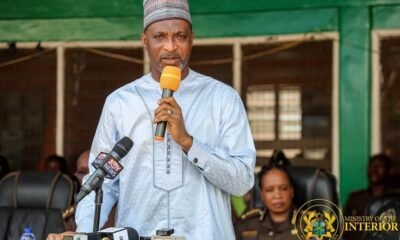Bussiness
Cost of borrowing to surge as IEA proposes Policy Rate of 20% or 20.5%

Cost of borrowing is expected to go up further, as the Institute of Economic Affairs (IEA) is urging the Bank of Ghana to increase the Policy Rate (PR) by 1.0% or 1.50% to 20% or 20.5%.
Its argument is that the upward adjustment will narrow the inflation-Policy Rate gap, although the real Policy Rate will still remain negative.
In a statement signed by its Director of Research, Dr. John Kwakye, it said furthermore, the adjustment will signal the MPC’s unwavering commitment to fighting the inflation and bring it under control.
“The adjustment will also send the right signal to, and help calm, the markets”, it added.
Furthermore, the policy think tank explained that the next meeting of the MPC in September 2022, when the Committee would have had the benefit of two more inflation readings in July and August, would give it a clearer sense of the trend for it to reposition the PR accordingly.
The Monetary Policy Committee (MPC) of Bank of Ghana will hold its 107th meeting to decide on the Policy Rate (PR) on July 20-22, 2022. Once again, the Committee faces a challenging decision as inflation shot up further to 29.8% in June, the highest in 19 years.
In May 2022, the MPC adjusted its policy rate for the second consecutive time to 19%
“To deal effectively with the current inflation—and to limit the harm that exclusive use of the PR could cause—we have called for the Bank of Ghana and Government to work together to target directly the key inflation drivers, viz. food, fuel, transport and the exchange rate. We have provided detailed suggestions to address these factors in a July 12 Roundtable paper titled: Rethinking Inflation Management in the Wake of Covi-19 and Russia-Ukraine War”, it proposed.
“In major countries such as the US and UK, the governments have made inflation control a top policy priority and are taking measures to complement their central banks’ actions. The same approach is needed in Ghana. Even the IMF that is known not to be a fan of subsidies, has called on member governments to provide food subsidies to their citizens to cushion the cost of living crisis. This call should tell us that new interventions are required in dealing with what is clearly an unconventional-type of inflation that is currently sweeping the globe”, it added.
The Monetary Policy Committee of the Bank of Ghana will begin its quarterly meeting tomorrow, with the primary focus of the committee is to craft a policy to help stem the continuous rise in inflation.
Already, interest rates have remained relatively stable on the money market for the third week running.
Source: Joy Business
Bussiness
Charterhouse announces the Business Elevate Series with launch of ‘The Gastro Feastival’

Charterhouse, Ghana’s leading event management and audiovisual production company, is marking its 25th anniversary of delivering top-tier events with the introduction of an exciting new initiative: The Business Elevate Series.
This innovative series is designed to shine a spotlight on key economic sectors through a series of dynamic B2B and B2C events, including industry conferences, seminars, and exhibitions.
Kicking off the series is The Gastro Feastival, a groundbreaking annual food industry festival that will showcase Ghana’s rich and diverse food ecosystem and agribusinesses from production to consumption.
The launch event will take place on Friday, March 7, 2025, from 4:00 PM to 6:00 PM at the Grand Arena (Accra International Conference Centre).
This landmark event will bring together food industry stakeholders, enthusiasts, experts, and organizations to highlight the food industry’s critical role in Ghana’s socio-economic development and culture.
It will also promote food security, digital innovation, women’s empowerment, youth employment in agribusiness, and sustainable practices.
The Business Elevate Series is a game-changing initiative designed to foster growth and transformation across multiple sectors. With Charterhouse’s deep expertise in organizing impactful meetings, the series aims to unlock investment opportunities, drive innovation, and catalyze social and economic change.
The Gastro Feastival will address six major pillars that drive industry transformation: Investment Opportunities; Job Creation; Innovation, Technology, and Digitization; Youth Involvement (entrepreneurship and career opportunities); Women’s Involvement; Environmental and Social Governance (ESG); Export Opportunities
The event will also establish a Resource Bank, spotlighting key growth opportunities and ensuring the effective allocation of resources to transform Ghana’s food industry.
The Gastro Feastival is a Charterhouse initiative, with Kosmos Innovation Centre as the technical partner.
Bussiness
Ghana’s GDP shows economy is fast recovering despite DDEP – Finance Ministry

Ghana’s Gross Domestic Product (GDP) indicates a rapid economic recovery despite global challenges and ongoing debt restructuring, according to the Ministry of Finance (MoF).
The Ministry in a statement today indicated that latest data from the Ghana Statistical Service (GSS), cumulative economic growth for the second quarter (Q2) of 2024 reached 6.9%, a notable increase from the 4.7% recorded in the first quarter of 2024.
The MoF statement further noted that, “The economy’s robust recovery is in response to the macroeconomic stability and growth interventions that government is pursuing under our IMF-supported Post Covid-19 Programme for Economic Growth (PC-PEG).”
According to them, the overall real GDP growth for the first half of 2024 rebounded strongly, with year-on-year GDP growth averaging 5.8% for the period, significantly higher than the 2.9% recorded in the same period in 2023.
By Edem Mensah-Tsotorme
Read full statement below









